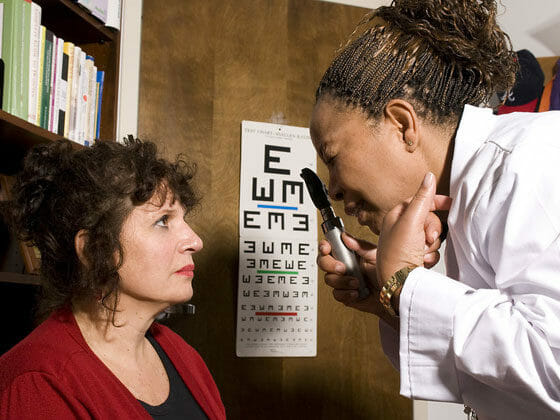Optometrist vs. Ophthalmologist: Here’s What You Need to Know

It’s critical that you take care of your eye health, but it’s just as important that you see the right eye doctor for the right kinds of eye concerns. When it comes to the health of your eyes, not all eye doctors are the same, either. You may already know that both optometrists and ophthalmologists are able to care for eyes, but do you know the difference between them?
Here is a basic breakdown of the differences between optometrists and ophthalmologists and when you might need to see either one for a situation involving the health of your eyes.
What Is an Optometrist?
You will probably see an optometrist for your eye examinations, to get prescriptions for corrective lenses, and for most of your basic eye care needs. An optometrist has a Doctor of Optometry degree, earned by successfully completing four years of optometry school after college, in addition to continuing education to maintain their license.
What Is an Ophthalmologist?
An ophthalmologist is a Medical Doctor (MD) with a specialization in vision and eye care. They typically have spent a year of internship and at least three years of hospital residency in ophthalmology, after four years of college and four years of medical school.
If you need eye surgery, you will generally be working with an ophthalmologist. Ophthalmologists can do eye exams and prescribe corrective lenses, but they are usually called in for more specialized eye care, such as diagnosing diseases of the eye, performing eye surgery, or prescribing eye medications.
The Right Eye Doctor for Your Annual Exam
While you can see either an optometrist or an ophthalmologist for your annual eye exam, corrective lens prescriptions, or examinations to determine the source of any vision difficulties you may be having, the optometrist is usually the first line of defense for such matters.
If he or she suspects a serious eye disease or issue, they may recommend you see an ophthalmologist for further action. Sometimes, depending upon the eye issue, you will have both an optometrist and an ophthalmologist co-managing your case as a team. Other times, your primary care doctor may decide whether to send you to an optometrist or to an ophthalmologist.
What Can Opticians Do?
The third type of eye care professional that we have not mentioned yet is the optician. Opticians are not doctors, but they are highly-qualified professionals trained in fitting eyeglass lenses and frames and contact lenses based on the prescriptions given to them by optometrists or ophthalmologists.
When it’s time to have your eyes examined in the Portland area, Beaumont Vision is ready and waiting. We have a team of skilled, professional optometrists who can examine your eyes in a comfortable, peaceful environment.
If you need new eyeglasses or contact lenses, we have a range of fashionable, high-quality products and dedicated opticians who are experts in helping you find the right fit. Contact Beaumont Vision to schedule your next eye appointment today.

